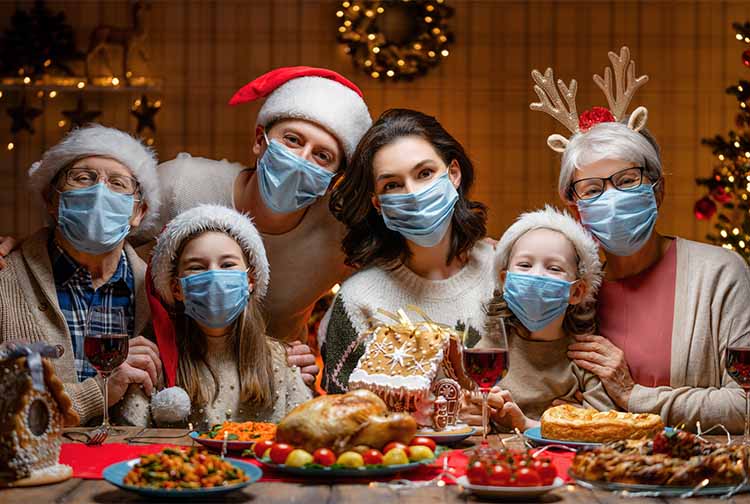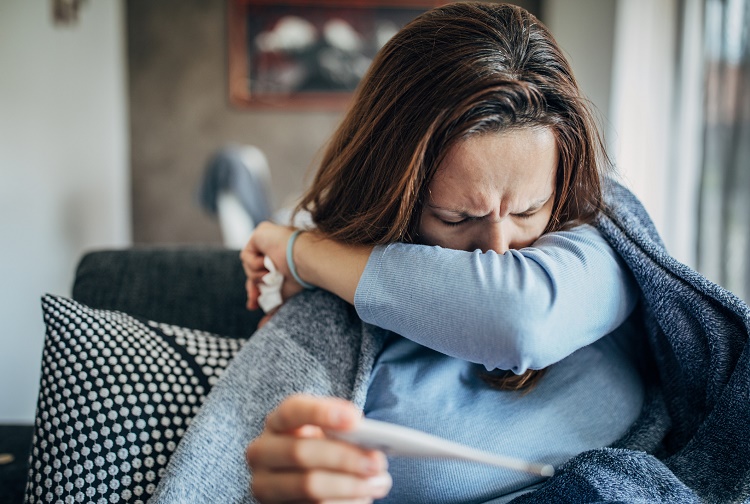
COVID-19 and the holidays: How to celebrate safely
Dr. Michael Stevens offers advice on how to lower your risk of catching or spreading the coronavirus this holiday season.
December 16, 2021 Photo: Getty Image
Photo: Getty Image
Last holiday season, as the pandemic raged and there was no vaccine, the nation struggled with juggling the need for family vs. the need for safety.
This year we have highly effective vaccines, and restrictions have eased to some degree for vaccinated people. But COVID-19 still exists, people are still dying or being hospitalized, and the need for caution is still with us.
As protective measures against COVID-19 continue, Dr. Michael Stevens, a VCU Health expert in infectious diseases, answers some common questions on how to celebrate safely during this second holiday season under a global pandemic.
 Is it safe to hold or attend holiday gatherings this year?
Is it safe to hold or attend holiday gatherings this year?
While it’s impossible to eliminate all risk from your holiday get-togethers, there are steps you can take to reduce your risk of catching or spreading the coronavirus.
The No. 1 thing you can do is get vaccinated, and make sure everyone in your family who is old enough to be vaccinated does so. All three vaccines approved in the United States — Pfizer, Moderna and Johnson & Johnson (J&J) are proven safe and effective.
If you qualify for a booster shot, get the booster shot. This is particularly important for adults 65 years of age and older, anyone who has a weakened immune system (immunocompromised) and people with a chronic medical problem.
Given the highly infectious nature of the delta variant, breakthrough infections can occur. If you are vaccinated, you likely won’t get that sick — but you can spread the virus to someone who may become critically ill and could even die.
Therefore, it’s important to continue with these safety steps so you and your family members will be healthy in time for your holiday event:
- Wear a face mask in public indoor spaces.
- Maintain social distancing of at least 6 feet in these spaces.
- Wash your hands often.
- Wear a face mask at crowded outdoor events where social distancing is hard to achieve.
Remember — you may be on vacation, but the coronavirus isn’t. Don’t let your guard down. Keep following these safety measures before, during and after the holidays.
In addition:
- Get a flu shot. COVID-19 is on everyone’s mind, but it’s flu season, too. A flu shot will reduce your chance of getting the flu and feeling ill. If you get the flu, it will be harder for you to fight off the coronavirus.
Don’t wait until the last minute for your flu shot. It takes a few weeks for the shot to protect you. Don’t take a chance. Do all you can to be healthy during your holiday visit.
- Visit vulnerable people another time. Older adults, pregnant women and people with weak immune systems, such as transplant recipients, are at higher risk of catching the coronavirus, and their symptoms are often more severe. For their safety, visit them one-on-one or by Zoom, Facetime or other video chat.
If you visit in person, wear a face mask, maintain a distance of at least 6 feet and wash your hands as soon as you arrive.
People who have even mild symptoms that could be COVID-19 should isolate and not gather with other family members.
Is it safe to travel long distance?
The safest way to celebrate the holidays this year is to celebrate with people in your own household. If you celebrate with extended family, encourage everyone who is eligible to be vaccinated to get vaccinated.
For holiday travel reachable by land, driving is your safest option — particularly if you are traveling with unvaccinated household members. Traveling by train, plane or bus exposes you to far more people. Maintaining a distance of at least 6 feet may be hard when dealing with seat assignments, security lines, boarding and exiting.
When traveling by train, plane or bus:
- Wear your face mask at all times except when eating — and try not to snack. You need to keep your mask on as much as possible.
- Avoid touching shared surfaces such as handrails, elevator buttons, doors and faucets.
- Wipe down surfaces or use a sanitary wipe when handling common objects, such as your tray table.
- Bring plenty of hand sanitizer and wash your hands often.
In addition to your transport vehicle, these rules apply to hotels, home-shares and rentals, as well as public restrooms and rest stops.
Take a taxi rather than a ride-sharing service, wear your face mask and open your window to improve air flow. Try not to share a cab with people outside your “social bubble,” and wash your hands when you get to your destination.
If you are not vaccinated, you should consider not traveling.
If you do travel, you should be tested with a viral test 1-3 days before your trip. After your trip, you should get a viral test 3-5 days following travel and quarantine for a full seven days, even if the test is negative.
What about hosting overnight guests or being an overnight guest?
Whether you are the host or the guest, to make this visit safe for everyone, follow the standard safety practices described above. In addition:
If you’re the host:
Set some rules to ensure the comfort of both you and your guests. Include:
- When to wear face masks
- How to maintain physical distance
- Are hugs, kisses and pats on the arm or back allowed?
- Are you requiring a COVID-19 test?
Make sure your guests sign off on the rules before they arrive to avoid clashes later. Stock your guest rooms and bathrooms with portable hand sanitizer.
Plan outdoor activities
Viruses spread easily indoors. If weather permits, eat outdoors, visit parks or play non-contact sports, such as croquet or tennis. Be sure to wipe down mallets, racquets and other equipment before and after, and wash your hands often.
If you’re the guest:
- Before making your travel reservation, ask your host for the house rules or state your needs. If you and your host disagree, it’s probably best to visit by video chat or phone. Save your physical visit for after the pandemic.
- Children age 2 and up can safely wear face masks. If your child is too young to wear a mask or can’t wear a mask for medical reasons, save your visit for another time.
- Bring lots of warm clothes. You may be spending more time outdoors.
- Bring plenty of hand sanitizer, and wash your hands often.
How can I make sure my event is safe?
Again, it's hard to eliminate all risk from your holiday gathering. The safest thing you can do is to get vaccinated, get a booster shot if qualified, and celebrate with the people in your household.
If you do invite a few close family members or friends, remember that older adults, especially if unvaccinated, are more likely to experience severe complications of COVID-19, including death. Although vaccination is incredibly protective, older adults are at higher risk for breakthrough infections.
That said, there are things you can do to make sure your event is, if not completely safe, at least safer:
- Set some rules. Inform guests in advance of the safety practices you will require, such as face masks and social distancing. Decide how you will enforce the rules if you have to.
- Think smaller groups. Rather than one big celebration with lots of people, hold more events with fewer people.
- Eating in vs. eating out. Restaurants will seat groups 6 feet apart, but you’ll be seated only inches from Uncle Joe or Aunt Lisa. At home, you can seat people 6 feet apart, or guests can mingle at a distance. Buffet dining is safe, as long as diners stand 6 feet from each other at the buffet. Use disposable dinnerware to avoid bumping elbows as you wash dishes.
- Schedule virtual facetime with those who can’t attend. Schedule a Zoom, Skype or other video chat so everyone can say hello to those at home because of increased risk, such as grandma and grandpa, great aunt Louise and anyone pregnant, sick or immunocompromised.
Remember – this pandemic will end at some point. Be safe. The precautions you take this year will help ensure a safe holiday the next.
This story was originally published December 18, 2020, and has been completely reviewed for accuracy for this holiday season.
See All News See COVID News


